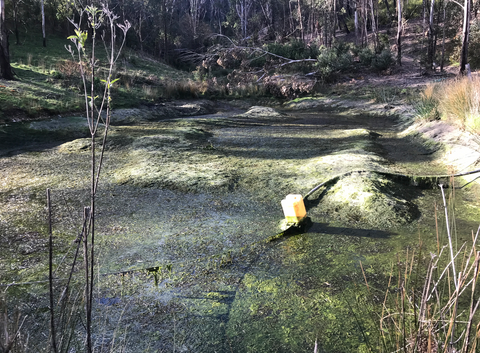Habitat restoration: Bring back more grass and clean water for wildlife
Now into our third summer since the bushfires, and with two huge floods the land is simply not capable yet, or for many many years being able to support even a small number of the wildlife what was once local to Rocklily.
We had 8 acres of grassed parkland’s which was something extra for the wildlife as there was plenty of grasses and shrubs to eat in the forests, this is not the situation now. What we had before bushfires at Rocklily is reduced and simply not enough to support the survivors. We are still support feeding watching closely.
Forests lack diversity due to the repeated extreme heat of firestorms. We now have far less variety of any native plants that wallaby’s can eat. Some inedible natives have taken over mixed with weeds and stands of falling blackened dead trees. Increasing numbers of saplings are coming up in grasslands in great numbers forming an dense layer. All this is not allowing light in even if there were grasses to grow and so no food for a huge variety of wildlife.
Our two spring fed dams, the only permanent water source for many kms for all wildlife, are a green stinking toxic mess. Nothing will drink from and main dam is filled with 2.5 meters deep of ash and topsoil.
We have tried, with the odd volunteer and friends to get work done its note enough, we spend every day working on something here. It is getting worse, were not even keeping up and with growth as summer warms and we have a problem that is becoming harder to fix.
Time to get serious, so we now have this gift so we can get help in. A digger to clean out the dam. Repair the destroyed normally dry creek bed and add dam protection. Reinstate the bushfire breaks around the grassed area and link it all up to make a better defense around the 8 acres, of grasslands, pens and buildings to shelter wildlife again. Getting help with clearing up the mess of dead trees and weeds in small area’s within the 8 acres. All of this massively helps wildlife in access more much needed grasses, and fresh water to drink.
Thank you form us all for your support of www.RocklilyWombats.com
Weeds both new to here and old have sprung up everywhere, here in Gidgets wombatorium we pull them up then we get something else.
Ink Weed issues feb 2023
We have photos and video's of wallaby's, kangaroos eating deadly Inkweed, all parts of this are deadly. It's sprung up worse madly after the rain's of last year have stoped in December, it's a big priority to remove. We are seeing a. number of unwell walllabys and a wallaroo and have no other explanation but they have been eating this. Even though birds spread it, we have lost more than half our magpie's currawongs and bower birds since December, they are just gone?. Did they eat too much of this. We had an Ecologist Lorri here on 23rd of Feb whom alerted us to the danger of this weed.

Inkweed is the green shrub everywhere, it was hidded under the thistle already removed and massive growth of gum trees in the wrong place post fire. This is just one creek bed and hence rains have helped move seed around, its the biggest patch we have. The rest is scattered over the property, in area's of dead trees and regrowth of guns and other odd native plants, adding up to around 100 times this amount.
We are carefully cutting this off at ground level and having to poison stem with a tiny dribble. Plant is then put on tarp to prevent seed spreading and added to a growing pile to dry out its covered with shade cloth to prevent being blown around by wind or letting birds eat more seeds . This will be burnt in winter. We hate using poision but have little choice.
To date (early march 2023 we have put in over 60 hours getting rid of thistle and 145 hours removing deadly inkweed. more than 1/2 these hours are paid as we having alot of trouble getting any volunteers whom want to travel here and do this kind of work. Its not all cuddling wombats.
Anyone wanting to come spend a day helping with this as a volunteer please contact us. Lunch and morning avo teas supplied.







